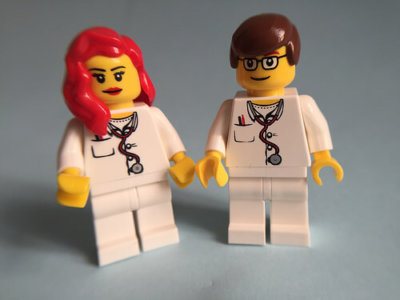Psychiatrist vs Therapist – What is the Difference?

By: THX0477
by Andrea M. Darcy
With the many titles that mental health care providers use nowadays, which one should you book an appointment with?
One of the biggest confusions is between psychiatrists and therapists — who are actually more different than alike.
(*Note that this article discusses psychiatry in the UK, which differs from the role of a psychiatrist in the USA.)
What is the same about a therapist and a psychiatrist?
The biggest similarity is that both a psychiatrist and a therapist share the same goal of helping you with your mental health.
They will both be knowledgeable about all the many kinds of mental health issues, disorders, and syndromes.
And both a therapist and a psychiatrist can choose to be a ‘generalist’, seeing many types of clients with different issues, or a specialist, choosing just to focus on one client group or issue, such as being a child psychiatrist or psychiatrist who helps people with adult ADHD.
And that is really where the similarity ends.
Psychiatrist vs therapist – the main differences
The biggest differences between a psychotherapist and psychiatrist working in the UK are:
- their goals in working with clients
- their training
- their ability to prescribe medication
- the regularity of client sessions.
A therapist is a mental health care practitioner. He or she has the goal of helping you recognise and navigate the issues that are holding you back in life. They do this by carefully listening to you talk, then reflecting back what you share with them (hence psychotherapy is also known as a ‘talk therapy’). A traditional psychotherapist will look at your past and early relationships, and other, more recent forms of therapy like CBT might simply look at your present ways of thinking and behaving.
You will usually see your therapist weekly.
Therapists are not licensed to prescribe medication.

By: sergio santos
A psychiatrist is a medically trained doctor. He or she has the goal of officially diagnosing what is behind your struggles, then offering you an individualised treatment plan. This will often (but not always) involve medication.
A psychiatrist will also talk to you about your life, but usually more in an investigative over open-ended fashion. They will, for example, use diagnostic testing, so might ask you many questions.
After your initial assessment, you will usually see your psychiatrist no more than once a month. This is to monitor your progress and make any needed adjustments to your treatment. Occasionally, such as with adults with very difficult issues or with children, a therapist might also spend time listening and use elements of talk therapies with clients.
The difference in training between a therapist and a psychiatrist
Both a psychiatrist and a psychotherapist spend a significant amount of time in school and training before receiving their qualification to practise.
A psychiatrist is a medical doctor who studied general medicine then decided to specialise in mental health issues.To be a psychiatrist is a hefty educational commitment in the UK of around 13 years. First you must take a five year recognised medical degree, followed by two years as a medical trainee and then a six year programme in psychiatry specialisation. (You can read more on the government’s National Careers Service site).
A therapist can take one of three routes to qualifying in the UK, all of which involve at minimum four years of education followed by time spent being a trainee. The classic route is to take a university degree in psychotherapy, learning the various schools of psychotherapeutic thought and approaches and how best to apply them in practice. You can also take a degree in psychology then do a masters in counselling psychology or psychotherapy, or take a certificate in counselling.
To learn the differences about these different ways of being a therapist, read our articles on:
Do psychiatrists and therapists deal with different mental health issues?

By: Philippe Put
Psychiatrists deal mostly with serious mental health issues, like syndromes and disorders. These are the sorts of mental health problems that completely alter an individual’s capacity to cope. This might include major depressive disorder, adult ADHD, a personality disorder like borderline personality disorder or avoidant personality disorder, bipolar disorder, and schizophrenia.
A therapist helps you with any issue at all that you feel is holding you back from feeling good about yourself and progressing in life. It might be a disorder or syndrome like the above, and you might be seeing a therapist after a referral from a psychiatrist. But you can also see a therapist for help over a generalised mental health complaint like low moods, anxiety, and stress, or a life problem like relationship issues, work life balance problems, and family and parenting challenges.
Can a person be a psychiatrist and a psychotherapist?
Yes, it is possible ( if perhaps rare, if only because of the years of training it would require). A psychiatrist might, say, decide to take additional certification to become a psychotherapist, and then work using talk therapies. Or a therapist could decide to retrain as a psychiatrist. (Note that in America, psychiatrists are all also thoroughly trained in talk therapies as part of their certification requirements, but this is not the case in Britain.)
How do I choose between seeing a psychotherapist or a psychiatrist?
In many cases you don’t have to choose. In the NHS, a psychiatrist will generally be part of a team that would include therapists or social workers with counselling training. Even if you hire a psychiatrist privately, they might recommend therapy as part of your treatment.
Even if they do not suggest therapy, it is a wise idea to consider it. Medication alone, while helpful for getting you back on your feet, is unlikely to lead to long-term coping strategies and new ways of behaving that are more productive.
I am not sure if I need to see a psychiatrist or a psychotherapist. What do I do?
If you are booking privately or through your work insurance, it can be cheaper and easier to book an appointment with a psychotherapist first (psychiatrists often have longer waiting times). A psychotherapist will give you an assessment and can refer you on if they think you have a more serious issue that would require psychiatry. Or, if you are seeing your GP for a referral, just be honest about what you are struggling with and they will suggest the most appropriate way forward.
Harley Therapy is an umbrella organisation that puts you in touch with some of London’s top mental health practitioners, including psychotherapists and psychiatrists dealing with both adults and children. Our in-house referral system means you get the right help for your issue.
Still have a question about psychiatrists vs therapists, or want to share a personal experience with other readers? Post your comment below.




